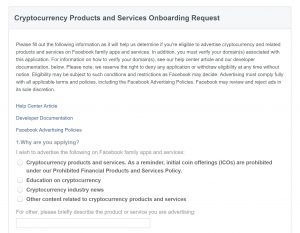Latest news about Bitcoin and all cryptocurrencies. Your daily crypto news habit.

Facebook is lifting its ban on cryptocurrency ads which went into effect in January. After months of evaluation, the company decided to allow some crypto ads on its platform. Advertisers must submit a request form with details of their businesses and the types of crypto content to be promoted.
Also read: Yahoo! Japan Confirms Entrance Into the Crypto Space
Facebook Unbans Crypto Ads
Facebook’s Product Management Director, Rob Leathern, posted updates Tuesday to the company’s “prohibited financial products and services policy.”
 In January, Facebook announced the policy to “prohibit ads that promote financial products and services that are frequently associated with misleading or deceptive promotional practices, such as binary options, initial coin offerings, and cryptocurrency,” Leathern explained. “This policy is intentionally broad while we work to better detect deceptive and misleading advertising practices… We will revisit this policy and how we enforce it as our signals improve.”
In January, Facebook announced the policy to “prohibit ads that promote financial products and services that are frequently associated with misleading or deceptive promotional practices, such as binary options, initial coin offerings, and cryptocurrency,” Leathern explained. “This policy is intentionally broad while we work to better detect deceptive and misleading advertising practices… We will revisit this policy and how we enforce it as our signals improve.”
Citing that the company has been studying the best way to refine this policy over the past few months “to allow some ads while also working to ensure that they’re safe,” he elaborated:
Starting June 26, we’ll be updating our policy to allow ads that promote cryptocurrency and related content from pre-approved advertisers. But we’ll continue to prohibit ads that promote binary options and initial coin offerings.
Which Ads are Allowed?
Leathern clarified that there are some restrictions so not all ads will be allowed. “We’ll listen to feedback, look at how well this policy works and continue to study this technology so that, if necessary, we can revise it over time,” he wrote, adding:
Advertisers wanting to run ads for cryptocurrency products and services must submit an application to help us assess their eligibility — including any licenses they have obtained, whether they are traded on a public stock exchange, and other relevant public background on their business.
 Request form provided by Facebook.
Request form provided by Facebook.
The application form entitled “Cryptocurrency Products and Services Onboarding Request” consists of six questions.
The first question plainly asks “why are you applying?” The applicant can choose between three options or provide their own reason. The first option is “Cryptocurrency products and services.” The second option is “Education on cryptocurrency” and the third option is “Cryptocurrency industry news.” However, the company reiterated, “As a reminder, initial coin offerings (ICOs) are prohibited under our Prohibited Financial Products and Services Policy.”
The second question asks whether the applicant has a Facebook Ad Account ID. Those who do not must create an ad account. The third asks about the applicant’s website domain and business details such as any licenses or regulatory certification the business holds, and if the business is a public company listed on a stock exchange.
The fourth asks for business information including an address. The fifth question asks for a brief description of products or services or other crypto-related content the site intends to promote while the final step requires the applicant to agree to the “Facebook Cryptocurrency Ads Addendum.”
In addition, the form asks the applicant to declare their domain(s) used in the crypto-related promotion:
You must verify your domain(s) associated with this application…we reserve the right to deny any application or withdraw eligibility at any time without notice. Eligibility may be subject to such conditions and restrictions as Facebook may decide.
What do you think of Facebook allowing approved crypto ads? Let us know in the comments section below.
Images courtesy of Shutterstock and Facebook.
Need to calculate your bitcoin holdings? Check our tools section.
Disclaimer
The views and opinions expressed in this article are solely those of the authors and do not reflect the views of Bitcoin Insider. Every investment and trading move involves risk - this is especially true for cryptocurrencies given their volatility. We strongly advise our readers to conduct their own research when making a decision.
